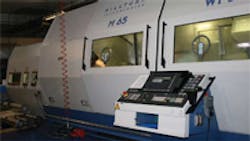Delcam Does Machining to Develop CAM Software
Delcam, the software developer and distributor of such products as PowerMILL, Partmaker, FeatureCAM and ArtCAM, has a special hands-on approach to its software development process.
Delcam operates a machine shop, its Tooling Services Division, next to its software development headquarters in Birmingham, England.
The main aim of the facility is to allow comprehensive real-world testing of software before it is released to customers. However, it also operates as a working machine shop which is profitable in its own right. It uses the latest machining and inspection technology from manufacturers such as Mecof, Anyak, Matsuura, Bridgeport, Renishaw and POLI.
“The Tooling Services Division has always had a dual role within Delcam,” Brian Hawkshaw, division director, said.
“While we provide a real-world testing environment for our CAM software during its development, we are also required to operate as a profitable business in our own right.”
Delcam just added a WFL mill-turn machine with a three-meter working capacity to the Tooling Services Division.
“Until recently, we have concentrated on five-axis machining, both because that was the main focus for our PowerMILL development team and because five-axis operations increased our ability to take on more complex jobs and complete them more efficiently.
“The move into mill-turn has had similar motives. Delcam has expanded its product range with the acquisition of FeatureCAM and PartMaker, both of which offer millturn functionality, so we needed equipment with the ability to test new developments in these programs.
“Secondly, we have received more inquiries for large-scale projects that would only be possible to undertake efficiently with a mill-turn machine. We were taking orders for work even before we acquired the machine, and its capacity is already booked for most of this year,” Hawkshaw said.
He added that Delcam’s Tooling Services Division duplicated the diversification into other industries that Delcam accomplished with its software business in recent years.
“The aerospace sector now provides our biggest source of work, rather than the toolmaking industry,” he said.
Delcam sees the manufacturing expertise it gains in its Tooling Services Division as an important part of the comprehensive support it gives to its customers.
Besides helping the ocmpany’s development teams, experience it gains in the division is passed on to its support staff.
Hawkshaw said Delcam’s support staff uses the knowledge developed in the division to give its software users advice on all areas of their work, including the best choice of machining strategy and cutter selection.
Being able to test such developments on-site obviously gives Delcam a major advantage in proving out its software.
“Many CAM programs generate data that is mathematically correct but that is often impossible to machine in practice,” Hawkshaw said, adding that the company’s machine shop had a roll in the development of its PowerMILL software for high-speed machining and shop-floor programming and that he expects the mill-turn equipment to have a similar role in developing software for multi-function machining.”
